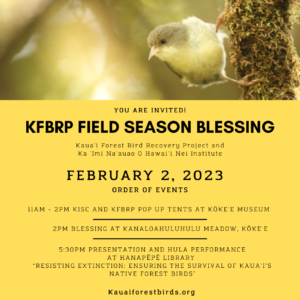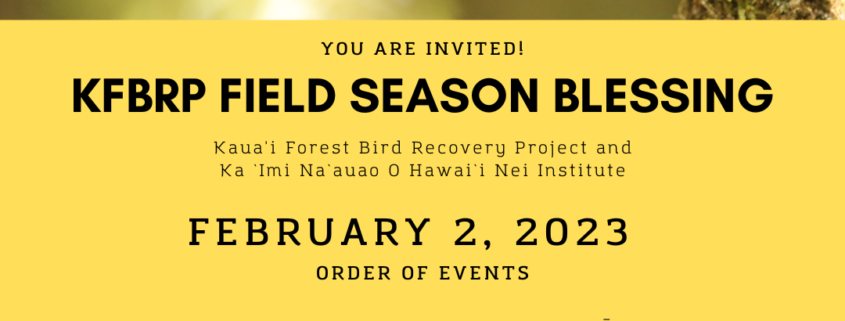KFBRP Annual Field Season Blessing

ANNUAL HAWAIIAN BLESSING MARKS BEGINNING OF CRITICAL KAUA‘I FOREST BIRD FIELD SEASON
(Hanapēpē, Kaua‘i) – The Kaua‘i Forest Bird Recovery Project (KFBRP) is holding its annual Hawaiian blessing for the 2023 field season, which for at least two species of Hawaiian honeycreepers is a critical year.
Of the eight remaining forest bird species on Kaua‘i, two face imminent extinction. The ‘akikiki and ‘akeke‘e, are threatened by mosquito-borne avian malaria. Warmer climates in recent years have allowed non-native mosquitoes to move to higher elevations, increasing the risk of disease to native forest birds. During this field season, KFBRP will collect as many of the the last remaining ‘akikiki as possible and place them under human care until mosquito control efforts can be implemented to ensure their survival in the wild.
Kumu and haumana of the Ka ‘Imi Na‘auao O Hawai‘i Nei Institute, and staff and volunteers from KFBRP will gather to bless the upcoming field season with songs and dances to invoke the protection and good will of the gods and the elders for Kaua‘i’s native forest birds and their habitat.
Forest bird recovery projects are a collaboration between the DLNR Division of Forestry and Wildlife and the University of Hawai‘i Pacific Cooperative Studies Unit.
- The blessing is scheduled for Thursday, February 2, 2023 at 2 p.m. Participants should meet at the pavilion at Kanaloahulululu Meadow in Kōke‘e.
- From 11 a.m. to 2 p.m., KFBRP and the Kaua‘i Invasive Species Committee will have informational booths set up next to the Kōke‘e Museum.
- At 5:30 p.m. project leader Dr. Lisa “Cali” Crampton will present in the meeting room at the Hanapēpē library: “Resisting Extinction: Ensuring the survival of Kaua‘i’s native forest birds.”
All events are free and open to everyone. Prepare for cold, windy and/or rainy weather conditions at Kōke‘e.
Due to the presence of Rapid ‘Ōhi‘a Death on Kaua‘i, participants are asked to clean all boots and equipment before traveling to Kōke‘e.



